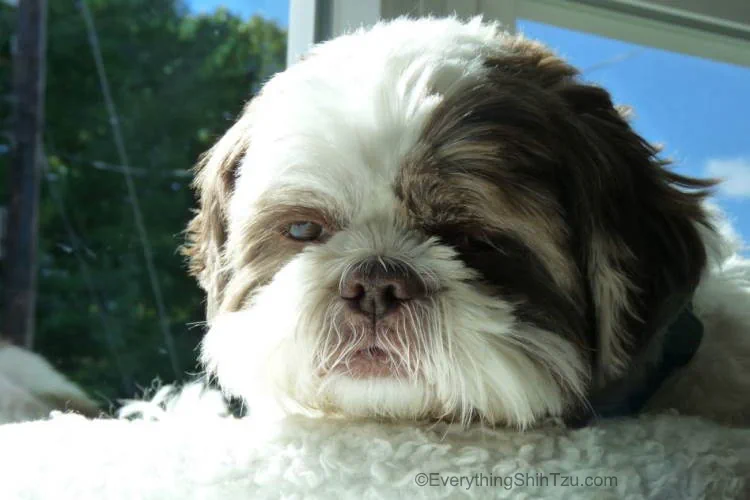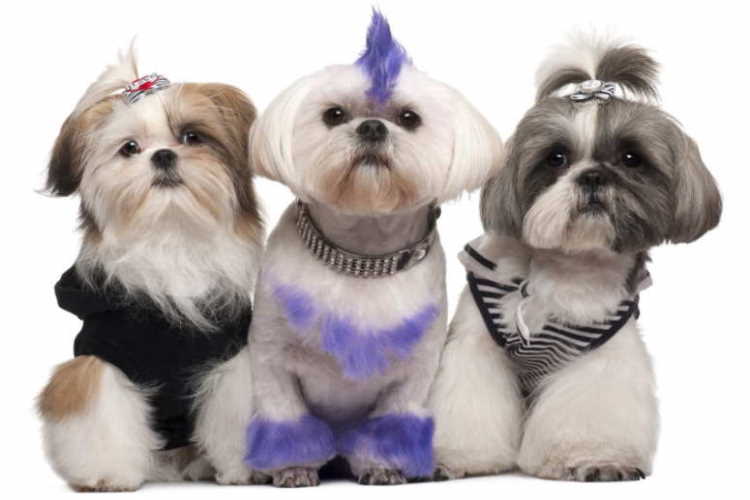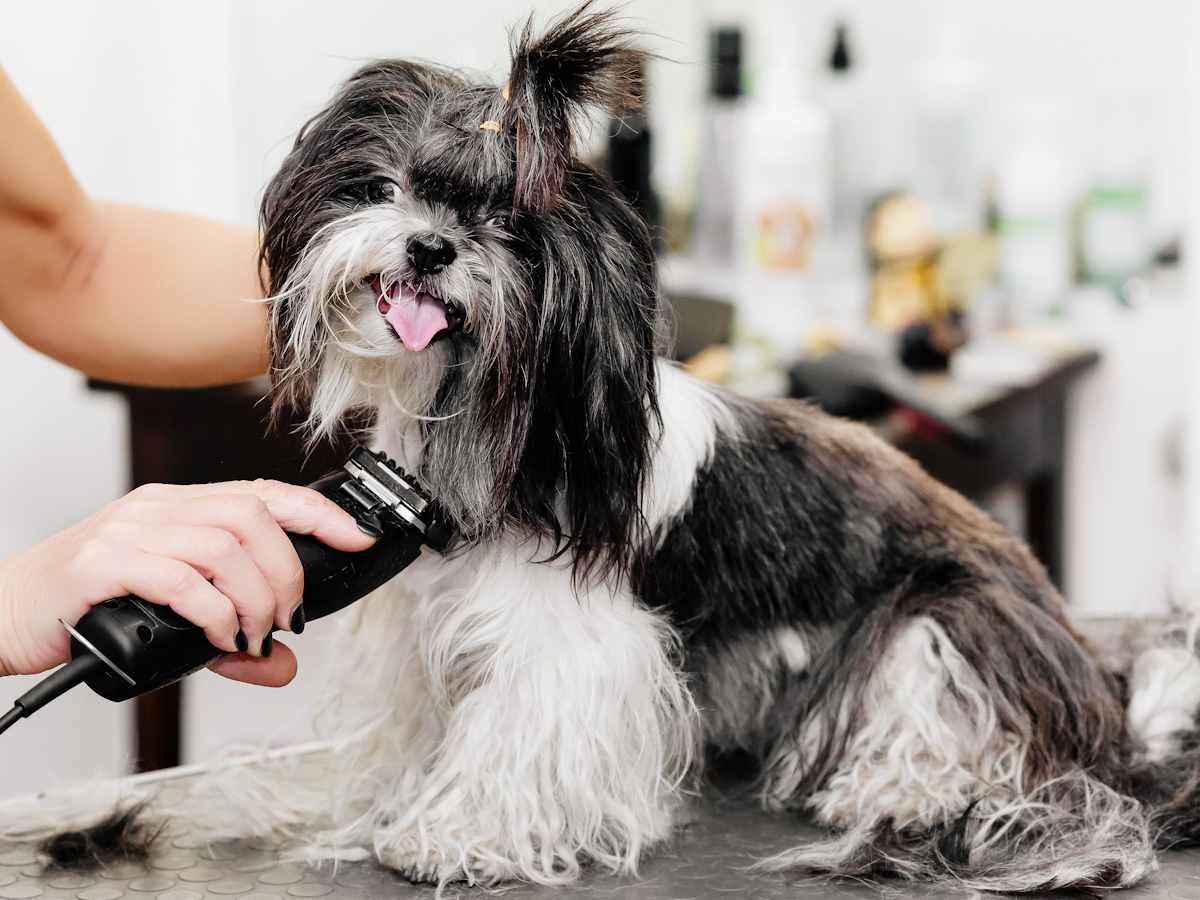Do Shih Tzu Shed? The Truth About Dogs and Shedding
By Everything Shih Tzu September 20, 2023
This post may contain affiliate links. Read privacy & disclosure policy for info
Many people consider Shih Tzu dogs to be a non-shedding dog breed, and that they are "hypoallergenic dogs."
But what's the reality of dogs that don't shed?
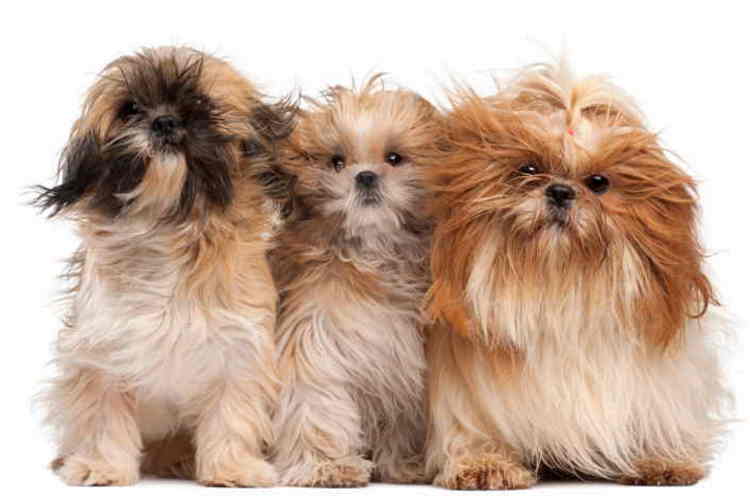 Do Shih Tzu Shed?
Do Shih Tzu Shed?As a Shih Tzu owner myself, I can tell you from personal experience that these adorable pups do shed, but not in the way you might think.
It is true that Shih Tzus do shed, but it is very minimal. This dog breed has a distinct double coat that is similar to human hair, which helps to trap any loose hairs making it unlikely you will find more than a few stray hairs on your furniture, carpets, or even your clothes.
So, while the Shih Tzu is not a non-shedding dog breed, being a low shedding breed makes the Shih Tzu suitable for allergy sufferers.
How Much Do Shih Tzu Shed?
One of the characteristics of the Shih Tzu breed is they have what is known as a double coat.
This second layer of hair plays an important role in preventing loose hair from collecting on floors and furniture.
The vast majority of these hairs, rather than falling onto their surroundings, will become entangled in the Shih Tzu's coat, where they will remain until they are brushed out as part of the Shih Tzu's regular grooming
This means you won't have to pull out the lint brush to clean up a bunch of hairs after these long-haired pooches have been lounging on the couch all day.
Nor will you have to worry about changing your clothes after you've cuddled with them before heading out to work.
And given that clumps of loose hair are not readily visible is probably why many people believe they are a non-shedding dog breed.
Shih Tzu's Double Coat Benefits Go Beyond Controlling Shedding
There are two kinds of hair on a dog: guard hairs, which are the outermost layer, and down hairs, which are the fuzzier, softer layer underneath.
A Shih Tzu has both kinds of hair.
Shih Tzu double-coated hair means that they have an outer layer of longer guard hairs and an inner layer of shorter down hairs.
Guard hairs are designed to protect the dog from the sun’s ultraviolet rays, dirt, and moisture.
They also help repel insects, so Shih Tzu dogs are always prepared for outdoor adventures.
While it’s normal to have both kinds of hair on your dog, the guard hairs should be longer than the down hairs.
How Often Do Shih Tzu Dogs Shed?
Shedding is the natural process by which your dog’s old hair is replaced by new hair.
It’s important to remember that not all dogs shed: some breeds have very little shedding, while others have very heavy shedding.
Double-coated breeds like Shih Tzus are known for having lots of hair.
Shih Tzu dogs shed throughout the year as part of their natural shedding cycle, but there are also seasonal shed cycles that happen every year.
Typically, shedding picks up in the summer and as the weather gets hotter.
Then, in the fall and winter months, shedding slows down again.
The shedding process of a Shih Tzu puppy, on the other hand, is a completely different story.
Why Your Shih Tzu Puppy is Shedding
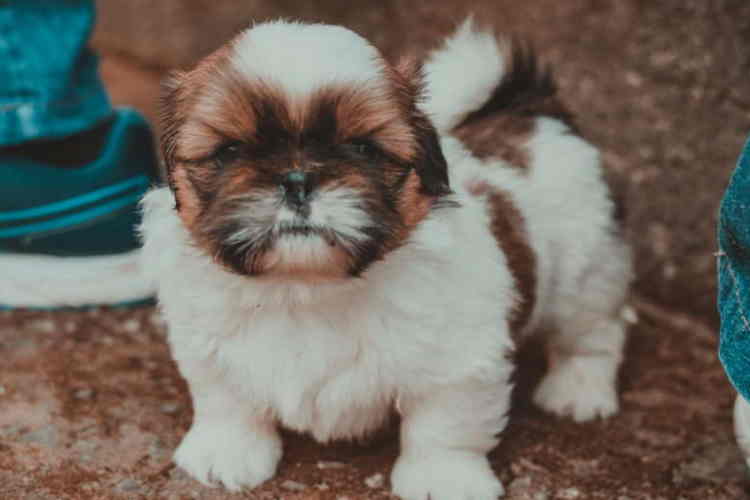
You've likely noticed that a Shih Tzu puppy's hair is different from that of an adult Shih Tzu.
A Shih Tzu puppy has finer, thinner, and shorter hair. And it isn't until the puppy is about 9 to 12 months old that the puppy's coat will change into its adult coat.
It's during the development phase from puppy to adulthood that you may see the most shedding due to an increase in the volume of hair.
Managing Shih Tzu Shedding: Tips and Tricks
Alright, now we've reached the part you've probably been waiting for: managing your adorable Shih Tzu's shedding.
While these little fur-balls don't shed as much as some other breeds, you'll still find a few stray hairs about.
But don't worry, I've got your back!
I'm going to share some practical tips and tricks I've figured out in my own journey with my Shih Tzu.
With these in hand, you'll not only keep your home hair-free, but also ensure your fluffy friend is as comfortable as can be.
1. Regular grooming is key
A consistent grooming routine has a few key benefits that directly impact shedding.
Brushing your Shih Tzu's coat daily performs a little two-for-one action—it detangles any knots, maintaining that gorgeous, flowing coat, while also catching and removing the loose hairs that would otherwise end up scattered around your home.
It's kind of like pre-emptively cleaning your house, but at the same time, you're giving your Shih Tzu a nice little pamper session.
Moreover, daily brushing stimulates the skin and the hair follicles, which can actually help to keep your Shih Tzu’s coat healthier, potentially reducing future shedding.
So, with a bit of regular grooming, you're hitting multiple birds with one stone—less shedding, a tidy home, and a happier, well-cared for pup!
2. Bathing your Shih Tzu
Bathing your Shih Tzu plays a dual role in managing shedding.
First, the water and shampoo help to loosen any hairs that are ready to fall out, capturing them in the bath instead of on your living room rug.
This is particularly effective when you follow up the bath with a thorough brushing.
You'll be amazed at how much loose hair you can catch this way!
Second, the shampoo itself can help to nourish your Shih Tzu's skin and coat, reducing dryness and irritation, which can sometimes lead to excessive shedding.
It's important to note here, however, that bathing should be done in moderation.
Over-bathing can strip the coat of natural oils that keep it healthy, potentially leading to more shedding, not less.
So, aim to bathe your Shih Tzu about once a month, and always use a high-quality, dog-friendly shampoo. This way, you're tackling shedding at the source and keeping your pet's coat in top condition!
3. Feed your Shih Tzu high-quality dog food
The food your Shih Tzu eats plays a surprisingly significant role in managing shedding.
I've learned that feeding my Shih Tzu high-quality dog food, rich in essential vitamins and nutrients, can lead to a healthier and glossier coat, which tends to shed less.
It's all about nutrients like Omega-3 and Omega-6 fatty acids, which are known to improve skin health and fur quality.
A diet high in these nutrients can help to strengthen hair follicles, reducing the amount of hair that falls out.
Plus, good dog food also supports overall health, which is crucial because health problems can sometimes trigger excessive shedding.
So, opting for a premium dog food, or even adding a vet-recommended supplement to your Shih Tzu's meals, can go a long way in managing shedding.
Remember, a healthy pup is a happy pup - and a less shed-prone one too!
4. Hydrate, Hydrate, Hydrate
Keeping a Shih Tzu hydrated is essential in maintaining their overall health, and particularly in reducing shedding.
Just like in humans, a significant portion of a dog's body is made up of water.
When they are well-hydrated, their body functions at its best. This includes their skin and coat health.
A well-hydrated Shih Tzu will have more supple skin, which helps to hold onto the hair follicles, preventing premature shedding.
Furthermore, proper hydration ensures that the natural oils in their skin, which keep their hair healthy and shiny, are maintained.
These oils give their coat a healthier appearance, and healthy hairs are less likely to shed excessively.
So, never underestimate the power of a simple bowl of fresh water for your Shih Tzu!
5. Invest in a de-shedding tool
While regular brushing plays a huge role in managing your Shih Tzu's shedding, the kind of brush you use matters too.
De-shedding tools are specially designed to reach deep into your Shih Tzu's thick, long coat, gently removing loose hairs before they have a chance to shed.
These tools can be a little more expensive than a regular dog brush, but trust me, they're worth every penny!
You'll be surprised at how much hair these tools can remove, and your furniture (and your sanity) will thank you.
6. Regular vet check-ups can help catch health issues that may cause excessive shedding
Finally, regular vet check-ups are crucial in managing your Shih Tzu's shedding.
Health issues, such as allergies, skin infections, or hormonal imbalances, can often cause excessive shedding.
By taking your Shih Tzu for regular vet visits, you can catch these issues early and treat them before they lead to serious shedding.
Remember, a healthy Shih Tzu is a less shed-prone Shih Tzu!
Is The Shih Tzu Hypoallergenic?
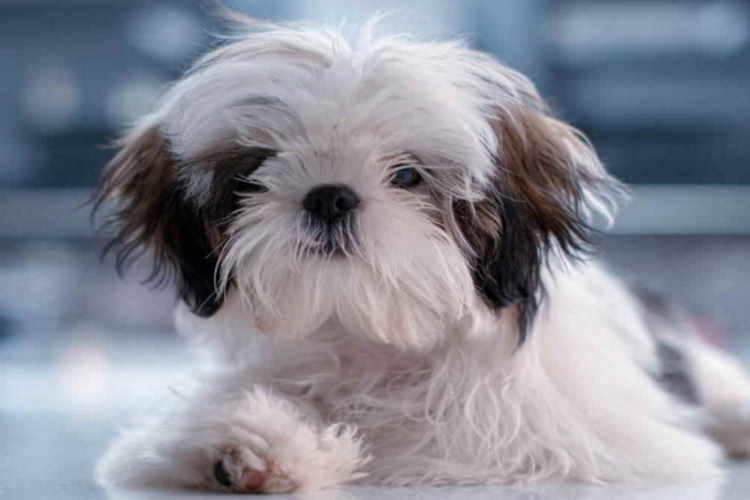
To say that something is hypoallergenic is to say that it is highly unlikely that someone will have an allergic reaction to it.
Due to the fact that a Shih Tzu does not shed or more specifically sheds very little, the allergen-causing dander that clings to their hair is less likely released into the air, onto the floor, the furniture, or your clothing, as it would be with a dog who sheds heavily.
So, are Shih Tzu good for people with allergies? Yes!
But...
As mentioned above, although the Shih Tzu is not a big shedder, their skin can still become dry and flaky.
It's the dry skin flakes, also known as dander, that could trigger an allergic reaction in some people.
Unfortunately, dry skin can happen with any dog breed and Shih Tzu are not immune to skin issues.
It's easy to tell when their skin is dry because they will be scratching quite a bit, their hair will be dull, and you'll see the tiny flakes on them, your furniture and your clothes after you've been cuddling with them.
The best way to keep his skin from becoming dry and his coat dull is to feed him the best dog food you can and brush him more often to stimulate oil glands.
Another beneficial option is to add some omega oils in his diet.
We've had pretty good luck using supplements; however, my dogs prefer the liver flavor omega oils compared to salmon.
I am particularly fond of the omega oil supplement in liver flavor that we use with our Shih Tzu dogs because they don't stink as many omega oil supplements do.
If you're less than enthusiastic about the fishy smell of typical omega oil supplements, look for the liver ones instead at your local pet supply store.
If they don't have them, you can usually find them on Amazon.
If after trying all of the above and the problem persists, have your veterinarian check him out for any underlying issues like food allergies or thyroid disease.
Does Brushing Help With Allergies?
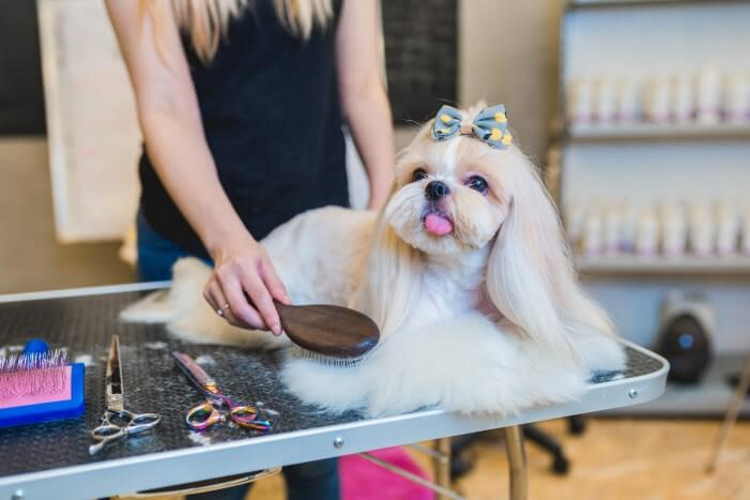
Regular grooming will help decrease the number of allergens on your dog, especially if your dog has dry skin.
Brushing your dog will help remove skin flakes while stimulating the skin's natural oils which act as a protective barrier against dander.
It's worth mentioning that since the Shih Tzu hair does tend to shed off into itself, and especially when the hair is kept long, brushing must be done daily.
Not only will daily brushing will help keep allergens from getting trapped in their long hair, but it will also help keep your Shih Tzus hair from getting tangled.
Tangles lead to knots. Pretty quickly thereafter, these knots become a tangled, matted mess, which is not easy to remove.
Matted hair pulls on the Shih Tzu's skin and causes pain and discomfort to them.
Even the easy-going Shih Tzu can become aggressive and nip at you, due to the mats causing them even more pain when someone touches them.
With matted hair, it becomes a haven for an insect invasion and skin infections do arise. You could try to get the mats out with a good slicker brush (like this self-cleaning brush from Amazon).
But usually, mats are so bad that brushing doesn't seem to help or could even make it worse. The only thing you can do when this happens is to have all their hair shaved off and start over.
There you have it...
So that's the truth about non-shedding and hypoallergenic dogs.
Keep in mind...no dog will be completely allergy-free to all people, but as far as a hypoallergenic dog or non-shedding dog breed go, the Shih Tzu comes pretty darn close.
